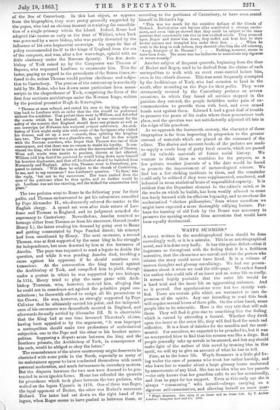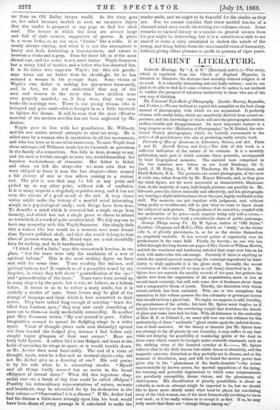WAYFE SUMMERS.*
A Nevet written in the autobiographical form should be done exceedingly well, or it is a mistake. This is an autobiographical novel, and it is done very badly. It has this prime defect—that it impresses us throughout with the feeling that it is a fictitious narrative, that the characters are unreal, and that the person who relates the story could never have lived. It is a volume of morose thoughts and gloomy moralizings. We had our presen- timents about it when we read the title-page. We rather feared the author who could talk of an inner and an outer life so coolly. It seemed highly probable that the outer life would be a hard trial and the inner life an aggravating nuisance. And so it proved. Our apprehensions were but too strictly veri- fied. There are certain pills which are warranted to cure de- pression of the spirits. Any one intending to read this book will require several boxes of these pills. On the other hand, some people like to be miserable. Here is the very tale that will suit them. They will find it give rise to something like the feeling which is caused by attending a funeral. Whether they dwell upon the inner or the outer life, they will find food for much sad reflection. It is a feast of dainties for the maudlin and the senti- mental. For ourselves, we expected to be preached to, but it was an unexpected blow to find that the sermon was like a dirge. But people generally take up novels to be amused, and lest any should make light of the author of this novel by treating him in this spirit, we will try to give an account of what he has to tell.
First, as to the inner life. Wayfe Summers is a little girl liv- ing under the care of persons who treat her rather harshly, and who leave her to wander about a large gloomy house uncheered by amusements of any kind. She has no idea who are her parents —she only knows that her guardian calls to see her occasionally, and that he pays for her support. Even at this early age she is always " communing " with herself—always carrying on a rigorous self-examination, and allowing herself no snore guar- • Weree Bummers. The story of an Inner and an Outer Life. By T. Archer London: Sampson Low and Co. 1603.
ter than an Old Bailey lawyer would. As the story goes on, her mind becomes morbid to such an excessive degree that the reader is prepared at any page to find her stark mad. The houses in which she lives are always large and full of dark corners, suggestive of graves. A piano in a room looks, or, as she says, "looms," like a coffin. It is nearly always raining, and when it is not the atmosphere is heavy and dark, foreboding a thunderstorm, and nature is between a choke and a gasp. Thus the inner life is of the most dismal cast, and the outer is not much better. Wayfe Summers has a misty kind of mother, and a father who has deserted her.
It is his father who supports Wayfe ; but this old gentle-
man turns out no better than he should sobe, for he has seduced a woman in his younger days. Some victim of
Wayfe's own father is making her appearance incessantly, and, in fact, we do not understand that any of the men and women in the story who have children were ever properly married ; or, if they were, they very soon broke the marriage vow. There is one young woman who is betrayed and goes mad—this is brought in as a little interlude to lighten the drama. It will be seen that the most offensive material of the modern novelist has not been neglected by Mr. Archer.
Wayfe goes to live with her grandfather, Mr. Willmott, and his son makes several attempts to steal her away. He is aided once by a woman who is mysterious in all her movements, and who has been or is one of his mistresses. To save Wayfe from these attempts old Willmott sends her to Cornwall, as governess in the family of a connection. She falls in love, strange to say, and the man is foolish enough to have her, notwithstanding her hopeless wretchedness of character. Her father is killed, and when we left the story—for we must own that we were obliged to leave it near the last chapter—there seemed a fair chance of one or two others coming to a violent end. The plot is one that may to left at any point and picked up at any other point, without risk of confusion. It is in many respects a singularly repulsive stoiy, and it has not even the excuse of a good moral at the end. A very clever writer might make the history of a morbid mind interesting, simply as a psychological study; such things have been done. To describe a mind which is removed but a single stage from insanity, and which has not a single grace or charm to attract us towards it, is a work of quite another kind. We defy any one to have any sympathy with this Wayfe Summers. One simply feels that a woman like her would be a memento mori more dismal than .Byron's polished skull, and that she would belong to that class of persons whom, as Mr. Mould says, we could cheerfully bury for nothing, and do it handsomely too.
"I think I cried a little," says this moonstruck heroine, in one place, but the tears were only the exudation of a sort of spiritual balsam." This is the most striking figure we have
met with for some time. Tears exuding like balsam, and spiritual balsam too It reminds U3 of a pamphlet issued by the bygeists, in which they talk about " gummification of the eye," and " gummification of the heart." Tears have been served up in many situps by the poets, but nwer, we believe, as a balsam before. It seems to us to be rather a nasty simile, but it is entirely a matter of taste. Some lovers may be glad of the change of language and ideas which is here submitted to their notice. They have talked long enough of catching "tears dis- tilled from luscious eyes ;" they may now catch something of more use to them—a really marketable commodity. In another part Miss Summers writes, "My soul seemed to grow. Callow imagination seemed to spread its fledgling wings in a wider space. Vistas of thought (their ends seen distantly) opened out from beyond the hedged plat, whence I had before only caught vague glimpses of their vast extent." Here are truly bold figures. A callow bird is not fledged, and is not in the habit of spreading its wings in space, or it would tumble down, as Mr. Archer does most lamentably. The end of a vista of thought, again, must be a fine and an unusual object—why did not Mr. Archer give U3 a drawing of one ? His evil genius is by his side when he is concocting similes. "Myself and all things bodily seemcd but as motes in the broad effulgence of eternal dawn." When did this ingenious rhap- sodist ever see a break of day that could be called effulgent? Possibly his extraordinary representations of nature, animate and inanimate, may be accounted for by his declaration in the first volume :—" Observation! it is a disease." If Mr. Archer had had the disease a little more strongly upon him his book would have been shorn of every passage in it calculated to make the
reader smile, and we ought to be thankful for the similes as they are. But we cannot consider that these morbid fancies of a - diseased mind were worth his writing two volumes about. Some remarks on natural history or a treatise on general science from his pen might be interesting, but it is a mischievous task to set oneself to write a story calculated to darken the minds of the young, and bring before them the most hateful vices of humanity, without giving either pleasure or profit to persons of riper years..































 Previous page
Previous page